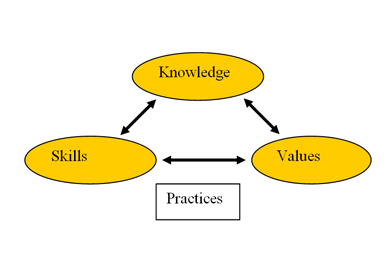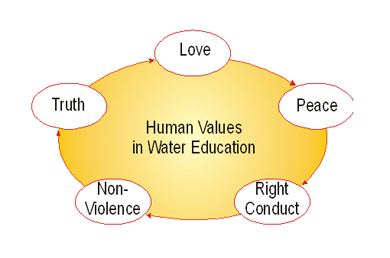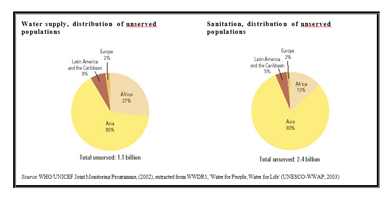|
Chapter 1 HUMAN VALUES IN WATER AND SANITATION EDUCATION: "Water supply does not run dry if drawn from the well of Human Values" 1. Introduction There is a compelling case for creating a new water use and sanitation-friendly ethic in human settlements. Ethics in the water and sanitation sector is of growing importance, especially to ensure improved governance, and more equitable and efficient water and sanitation service. When we practice human values at work, they are internal motivators that help us do our best and reinforce good character, morality and ethics. What are Human Values? 2. A UN-HABITAT perspective What is Human Values based Water, Sanitation and Hygiene Education (HVWSHE)? HVWSHE is a process in which individuals gain awareness of their living environment and acquire knowledge, skill, values and experience, and also the determination, which will enable them to act - individually and collectively – to solve present and future water, sanitation and related hygiene problems.. The acquisition of knowledge and skills by themselves does not create a new water and sanitation ethic. It is through the application of human values in their day-to-day activities children make decisions that conserve and value water, practise good hygiene and sanitation practices.
HVWSHE properly understood, should constitute a comprehensive lifelong education, one responsive to changes in a rapidly changing world. It should prepare the individual for life through understanding of the major problems of the contemporary world vis-à-vis water, sanitation and hygiene, and the provision of skills and attitudes needed to play a productive role towards improving living condition and protecting the living environment with due regard given to ethical values. Human Values-Based Water, Sanitation and Hygiene Education is an innovative approach that seeks to not only impart information on water, sanitation and hygiene but also inspires and motivates learners to change their behaviour with a view to promoting wise and sustainable use thereof. It has various dimensions which are represented in the table below:
Through this approach, we can promote a better understanding and facilitate the emergence of a new water management ethic. This tool can be an entry point into supporting positive attitudinal change among students, teachers and all those involved in the education process.
The Second World Water Forum held in The Hague deliberated about the values of water and came up with 6 values, i.e. Life-giving value; Social value; Economic value; Values of ecosystem and Cultural and Spiritual value. Later on, The Task Force highlighted the importance of Human Values for sustainable water management. Johannesburg consultation in South Africa from 30 April to 2 May 2001 adopted a values based approach to water and sanitation education which includes truth, right conduct, love, peace and non-violence.
Below is a table detailing some examples of the relationship of Human Values to key issues in Water, Sanitation and Hygiene Education:
HVWSHE has been an integral part of UN-HABITAT's Water for Cities Programme to create a new water and sanitation ethic that will promote positive behaviours to minimize the current water wastage in cities through promotion of water education. To achieve this aim, the capacity of the schools and communities needs to be optimized as it requires ample effort and time to change the current attitude,. This aim is intended to turn this positive behavioural change into reality through integrating "Value Based Water, Sanitation and Hygiene Education" in formal, non formal and informal mediums of education. Practical Applications of the Core Values
3. The African Experience UN-HABITAT has been implementing Values-Based Water Education in nine demonstration countries (Cote d’Ivore, Cameroon, Mali, Niger, Burkina Faso, Senegal, Ethiopia, Ghana, and Uganda) as part of its Water for African Cities (WAC) Programme. With support from the Swedish International Development Agency (SIDA) and the The African Institute of Sathya Sai Education (TAISSE), the human values based water education programme has proved itself as a truly path-breaking and innovative education initiative in Africa. It is worth noting, as mentioned earlier, that the Human Values approach was recommended as a water education tool for African children and communities by the Expert Group Meeting held in Johannesburg, South Africa from 30 April to 2 May 2001. The Expert Group composed of international and regional experts on water education, curriculum development, and urban water resources management, observed that the introduction and implementation of the Human Values approach to water education through formal, non-formal and informal channels of learning, is a promising strategy to bring about a positive and lasting change in attitude and behaviour towards water at all levels of society, especially through the use of curriculum. The relevance of the approach to the education needs of African countries has been demonstrated by the overwhelming positive response and declaration of commitment to project implementation expressed by educational experts in the six pilot countries. The remarkable results achieved by HVWSHE in Africa can be summarised as follows:
4. HVWSHE in South-East Asia HVWSHE is a part of UN-HABITAT’s Water for Asian Cities Programme. In Asia many people pay a high price with death, disease, disability and economic hardship due to the lack of access to clean water and safe sanitation. Asia is home to eighty percent of the global population without access to improved sanitation, and almost two-thirds of the world’s population without access to improved water supply. To meet the United Nations Millennium Development Goals of reducing by half the proportion of people without access to improved water and sanitation services by 2015, some additional 1.5 billion people in Asia will need access to adequate sanitation facilities, while an additional 980 million will need access to safe water.
The overview of the comparative water and sanitation status and conditions of urban Asia in figures shows the significant level of need of the efforts to meet the standard of liveable city and definitely to fulfil the targets of MDGs.
Sources: UN/WWAP. 2003. UN World Water Development Report. Water for People, Water for Life. UNESCO/Berghahn Books. / Global Water Supply and Sanitation Assessment 2000 Narrowing it down to the conditions of South-East Asia, the picture remains alarming. The poverty and disease prevalent in this part of the region due to lack of access to adequate water and sanitation facilities, and on the other hand extreme poverty never makes them able to have access to these facilities, which aggravates causes for deteriorating their well being. It is the vicious circle of poverty and health majority of poor people in South East Asia are currently facing because of poor water and sanitation. In the South-East Asian context in water and sanitation, and especially in perspective of its rich and diverse tradition and culture, we see that water, historically, has indeed been valued to a great extent in this region. Water is worshipped, and is linked with every ritual of human life. However, with the rapid changes the attached values has somewhat diminished over generations. HVWSHE thus plays an important role in eliciting the inherent values so that it can play a major role in behavioural and attitudinal change among the South-East Asian population towards water ethics. In South-East Asia, for example in Cambodia, the situation in regard to water and sanitation services is a serious concern, especially in rural areas and secondary towns, where a large part of the population, and particularly the poor, remain unserved. The high level of arsenic that has been detected in some of the existing wells across the country is also an increasing concern. In Laos, water and sanitation coverage in secondary and district towns remains a major concern. Similarly in several of the other South-East Asian countries providing access to improved water and sanitation services remains a challenge to their Governments. An understanding is slowly emerging that it is not enough just to increase investments related to water and sanitation but requires appropriate measures to ensure sustainability of investments and proper utilisation of scarce resources. For this HVWSHE can be a panacea, which addresses the issues of environmental sustainability, social equity and economic sufficiency through behavioural change. In 2003, one of the first regional activities of the Water for Asian Cities programme, UN-HABITAT, SEAMEO and the Government of the Philippines held Regional Consultations on Water Education in Asian Cities. The consultations were attended by over 100 participants drawn from 20 countries of the Asia Pacific region, including ten member countries of the South East Asian Ministers Education Office (SEAMEO). The consultation over a four day period shared experiences and best practice on value-based water education (VBWE) from Asia and other parts of the world, particularly Africa, as well as on innovative investment programmes for water and sanitation in schools. It also developed a strategy for conducting VBWE and water and sanitation investments in Asian Cities and some participating countries developed national action plans for VBWE. At the closing of the Consultation the participants adopted a Joint Statement endorsing a value-based approach to water and sanitation education. In addition the participants welcomed a draft Statement by SEAMEO in which it pledges commitment to support and promote Value-based water Education in the region. The draft statement was then presented and discussed at the SEAMEO High Officials Meeting held in Bangkok in December 2003. On 1st March 2004, a joint Ministerial Declaration was signed by 10 SEAMEO Ministers declaring their willingness to promote and support regional coopertion on value-based water education. In order to achieve the goals, the project aims to act in the following manner. Develop competencies of teachers in selected schools in
Develop a set of prototype teaching/ learning materials, lesson plans, activity guides, among others, on HVWSHE for use in SEA schools Document experiences, lessons learnt and effective practices in introducing HVWSHE in Southeast Asian schools Develop a toolkit on HVWSE for project officers of the Asian Development Bank; and Develop a common Water and Sanitation (WATSAN) facilities assessment protocol among the Southeast Asian Ministries of Education. Regarding WATSAN assessment of schools, a total of 588 schools have been selected for the exercise. A questionnaire has been developed and translated in 5 languages. Significant work is under progress regarding integration of HVWSHE in the lessons, strengthening QEE schools as knowledge centres, advocacy among educators and community leaders, and documentation and packaging of learning and/or knowledge gained. Besides SEAMEO, in South-East Asia, UN-HABITAT has developed a cooperation agreement with the Society for Preservation of Water, Thailand. Much work is progressing regarding developing a model human values based water classroom in Lopburi province in Thailand. 5. Conclusion UN-HABITAT feels that HVWSHE in South-East Asia will definitely trigger improvements and progress in the water and sanitation sector. Such an initiative will be conducive towards breaking the vicious cycle of poverty and access to improved water and sanitation, as HVWSHE is a strategic entry point to bring about positive attitudinal changes between both service users and providers, and in the longer term, can help develop a new water-wise and sanitation-friendly ethic in society.
|


